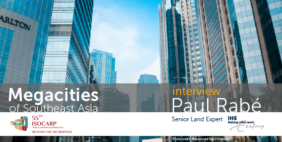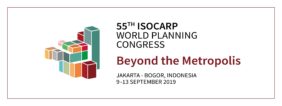
In your research, you have focused on land-sharing policies in Phnom Penh, Cambodia. Why did land-sharing instruments emerge in urban land governance and where do you see them appearing in the rapidly urbanising cities in Asia?
Paul Rabé: Land sharing emerged as a “win-win-win solution” to the problem of land conflict between urban “slum” dwellers and landowners (whether public institutions or private landowners) in Bangkok in the 1970s. Since then, land sharing projects have materialized in dozens of cases in Thailand and Cambodia and selected other cities in Asia. The attraction of land sharing for local governments is their potential to deliver a conflict-free solution to land conflicts—and the peaceful removal of slums—whereas for landowners the technique offers the possibility of a managed resolution to long-standing conflicts that present an obstacle to land development. For “slum” dwellers, too, land sharing is attractive as it holds out the promise of secure tenure in new housing in roughly the same city-center locations. For all these reasons, land sharing has a lot of potential in rapidly growing and rapidly densifying cities in Asia, where local authorities face the challenge of enabling affordable housing in an environment of rapidly rising land values.
You wrote that land-sharing is a “innovative but insufficient instrument” for tenure security of the urban poor. What are the main findings of your research in Phnom Penh? Under what conditions can it produce a “win-win-win” outcome for the municipality, private actors and urban poor communities?
Paul Rabé: As I wrote, the Bangkok and Phnom Penh land sharing cases illustrate that the land sharing technique has several limitations. It can be a long, drawn-out process whose benefits may be out of proportion to the human resources and time resources invested in it, particularly in the case of small settlements. Moreover, the technique has so far been limited to public lands, as public authorities have felt more pressure than private landowners to seek compromise and invest resources (even if limited) on behalf of the poor. The Phnom Penh cases demonstrate that perhaps the most important limitation of land sharing is that, in an environment with still weak legal and institutional protection of the poor, the process is unlikely to lead to an agreement that benefits slum dwellers, particularly in the absence of active and impartial mediation between slum dwellers and developers. However, where genuine political will does exist to seek mutually beneficial development outcomes, and where there are impartial and active intermediaries who are willing to invest their time and resources in helping slum communities and landowners find a mutually acceptable solution, land sharing can be a potentially innovative and flexible slum redevelopment instrument in cities characterized by active land markets.
What were the challenges of implementing these schemes?
Paul Rabé: The main challenges in Phnom Penh to the successful implementation of land sharing cases during the first decade of the 21st century were mainly institutional, and specifically, the lack of impartial and active intermediaries to help negotiate a land sharing agreement. Without such intermediaries, slum communities ended up having to negotiate directly with land developers and government authorities (as landowners)—a task for which they were poorly equipped. Moreover, tensions within the communities (between community leaders, between leaders and other residents, and among residents—sometimes exacerbated by developer bribes) made their task all the more difficult.
In two weeks, ISOCARP is organizing its 55th World Planning Congress on megacities in Jakarta in Indonesia. How relevant are these insights to city managers and planners in the megacities of Southeast Asia today?
Paul Rabé: The lessons from land sharing in Thailand and Cambodia (from the 1970s to the present) remain very relevant to city managers and planners in the megacities of Southeast Asia, since the same constellation of problems continues to exist in these cities: the lack of affordable housing in the larger cities; the lack of secure land tenure for urban poor populations; insufficient political will to enable the urban poor to access affordable housing and land; and insufficient awareness of the importance to healthy cities of making available affordable housing (and secure tenure) to urban poor population groups.
What is particular about land markets for the urban poor in the region as well as in Indonesia?
Paul Rabé: A noteworthy urban trend across the region (and in other developing country regions) is the transformation of many city centers into enclaves of middle class and higher income zones, through beautification campaigns, policies to banish the poor and informal activities from city centers, and “passive” land policies that result in ever-shrinking spaces for the urban poor and ever-expanding spaces for commercial real estate development that exclude the urban poor. In short, there are very few land market policies that favor the urban poor—and decreasing political will to change these policies.
Your students at IHS participate at a research workshop on Equitable Urban Land Governance. Can you elaborate on what you understand under this regime and what are the policies and instruments, other than land-sharing, that can create more equitable and sustainable outcomes?
Paul Rabé: In the research workshops on Equitable Urban Land Governance at IHS, students share with each other their ongoing research work on urban land governance for sustainable development, as part of the development of their MSc theses on urban land governance topics within the framework of the Urban Management and Development degree program at IHS. Many policies and instruments of equitable urban land governance are discussed and evaluated, including planning, administrative and land market instruments. The suitability of these various instruments is discussed, within the context of locally specific institutional and socio-economic realities.
Lastly, in your opinion, are the Sustainable Development Goals and the New Urban Agenda taking the right approach to promote equitable urban land governance?
Paul Rabé: The Sustainable Development Goals and the New Urban Agenda are a big step in the right direction towards equitable and sustainable urban development for all, but as so often with these promising goals and instruments, it is their implementation that counts! The missing dimension is so often political will and the lack of political leadership to follow through and enforce these goals. Therein lies perhaps the biggest challenge for truly sustainable development.
Paul Rabé is Senior Land Expert and Head of the specialization on Urban Land Governance for Sustainable Development at the Institute for Housing and Urban Development Studies (IHS), which is part of Erasmus University Rotterdam. Paul is also attached to the International Institute for Asian Studies (IIAS) at Leiden University, where he is Academic Coordinator of the Institute’s cities programs.
Between 2007 and 2010, Paul worked on—and researched—land sharing in Phnom Penh, Cambodia, and he is currently still researching evolving land sharing modalities in Bangkok, Thailand. Paul has over 25 years of experience in advisory work, capacity building and research in urban land governance topics, particularly land management and access to land. He has worked on advisory projects in Southeast Asia, Africa, the Middle East and the Balkans, on a range of land instruments and policies related to housing, planning, poverty reduction, and the environment. Paul’s current work and research focus on the intersection of land policy and the management of water resources in urban and peri-urban areas. This “land and water” initiative is one of three main clusters within the Urban Land Governance for Sustainable Development specialization at IHS.
Contact Mr Rabe via rabe@ihs.nl (IHS) or p.e.rabe@iias.nl (IIAS)
